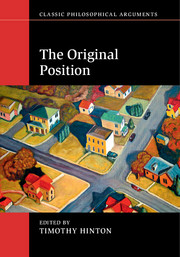Book contents
- Frontmatter
- Contents
- List of contributors
- Acknowledgments
- List of abbreviations
- Introduction: the original position and The Original Position – an overview
- 1 Justice as fairness, utilitarianism, and mixed conceptions
- 2 Rational choice and the original position: the (many) models of Rawls and Harsanyi
- 3 The strains of commitment
- 4 Our talents, our histories, ourselves: Nozick on the original position argument
- 5 Rawls and Dworkin on hypothetical reasoning
- 6 Feminist receptions of the original position
- 7 G. A. Cohen's critique of the original position
- 8 Liberals, radicals, and the original position
- 9 The original position and Scanlon's contractualism
- 10 The “Kantian roots” of the original position
- 11 Stability and the original position from Theory to Political Liberalism
- 12 The original position in The Law of Peoples
- References
- Index
10 - The “Kantian roots” of the original position
Published online by Cambridge University Press: 05 December 2015
- Frontmatter
- Contents
- List of contributors
- Acknowledgments
- List of abbreviations
- Introduction: the original position and The Original Position – an overview
- 1 Justice as fairness, utilitarianism, and mixed conceptions
- 2 Rational choice and the original position: the (many) models of Rawls and Harsanyi
- 3 The strains of commitment
- 4 Our talents, our histories, ourselves: Nozick on the original position argument
- 5 Rawls and Dworkin on hypothetical reasoning
- 6 Feminist receptions of the original position
- 7 G. A. Cohen's critique of the original position
- 8 Liberals, radicals, and the original position
- 9 The original position and Scanlon's contractualism
- 10 The “Kantian roots” of the original position
- 11 Stability and the original position from Theory to Political Liberalism
- 12 The original position in The Law of Peoples
- References
- Index
Summary
Introduction
In §40 of TJ, Rawls tells us that “there is a Kantian interpretation” of justice as fairness “based upon Kant's notion of autonomy” (TJR, p. 221), and goes on to say:
The original position may be viewed, then, as a procedural interpretation of Kant's conception of autonomy and the categorical imperative within the framework of an empirical theory.
(TJR, p. 226)Likewise one of Rawls's aims in “Kantian Constructivism in Moral Theory” is “to set out the Kantian roots” of justice as fairness by showing how it incorporates “the distinctive features of Kantian constructivism” (CP, p. 303). Those features he summarizes as follows:
What distinguishes the Kantian form of constructivism is essentially this: it specifies a particular conception of the person as an element in a reasonable procedure of construction, the outcome of which determines the content of the first principles of justice. Expressed another way: this kind of view sets up a certain procedure of construction which answers to certain reasonable requirements, and within this procedure persons characterized as rational agents of construction specify, through their agreements, the first principles of justice. The leading idea is to establish a suitable connection between a particular conception of the person and first principles of justice, by means of a procedure of construction.
(CP, p. 304)This is to say that Kantian constructivism deploys a Kantian conception of the person as free and equal agents with different rational and moral capacities, and that this conception of the person is the basis of a deliberative procedure incorporating different requirements of practical reason that is used to justify a set of normative principles. In justice as fairness, of course, the deliberative procedure is the rational choice in the original position. Furthermore, within a constructivist theory the standard of correctness for a set of normative principles is that they result from the employment of this procedure. In PL, where Rawls sees the need to develop justice as fairness as a political conception of justice, he pulls back from its Kantian lineage to present it as a free-standing political view that does not presuppose any comprehensive moral doctrine. Here he stresses the contrasts between political constructivism and both Kant's moral constructivism and intuitionist moral realism. Still, the structural parallels between justice as fairness as a form of political constructivism and Kant's moral constructivism remain.
- Type
- Chapter
- Information
- The Original Position , pp. 201 - 223Publisher: Cambridge University PressPrint publication year: 2015



